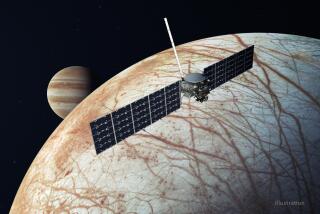JPL Gives Up Search for Lost Mars Orbiter
- Share via
Weary flight controllers at the Jet Propulsion Laboratory abandoned their vigil for the missing Mars Climate Orbiter on Friday after searching the heavens vainly with the antennas of the Deep Space Network for any emergency signal from the spacecraft.
“We are giving up the ghost,” said JPL news chief Mary Beth Murrill.
The $125-million space probe disappeared Thursday at the end of a 461-million-mile journey to Mars as it began orbiting the Red Planet for a two-year study of Martian weather and atmosphere. The Climate Orbiter would have become NASA’s first interplanetary weather satellite.
A suspected navigation error brought the craft too close to the Martian atmosphere, where it apparently broke apart, burned up or crashed, officials said.
Three investigating panels are being organized by JPL and NASA to pinpoint the cause of the loss, Murrill said.
JPL engineers estimated that the altitude of the spacecraft’s closest approach to Mars as it was firing its engine to enter orbit was 35 miles, about 55 miles lower than planned.
NASA officials expressed surprise at the size of the navigation error, given JPL’s unerring accuracy in aiming generations of unmanned space probes to distant planets and moons.
“I’m shocked that it was that much,” said Edward Weiler, NASA’s associate administrator for space science. “Something is wrong in the process.”
NASA officials said the scientific goals of the mission can be pursued with other spacecraft in the agency’s busy program of Mars exploration. The mishap will not affect a second Mars probe, the Mars Polar Lander, now approaching the planet for a Dec. 3 landing.
“We intend this to be a case of science delayed, not science lost,” said Carl Pilcher, NASA’s science director for solar system exploration.
More to Read
Sign up for Essential California
The most important California stories and recommendations in your inbox every morning.
You may occasionally receive promotional content from the Los Angeles Times.










